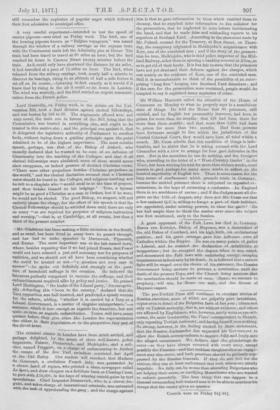Lord Granville, on Friday week, in the debate on the
Uni- versities Bill, took a final division against clerical fellowships, and was beaten by 103 to 69, The arguments offered were not very novel, the main one in favour of the Bill being that the Commission was trusted in everything else, And might to be trusted in this matter also ; and the principaL one against it, that it .delegated the legislative authority of Parliament to another body, .without laying down a guiding principle upon the point admitted to be of the highest importance. The most notable speech, perhaps, was that of the Bishop of Oxford, who roundly declared that he wanted to be sure of an infusion of Christianity into the teaching of the Colleges, and that if all clerical fellowships were abolished, some of them would never elect clergymen, or indeed persons of decided Christian views. "There were other prejudices besides Christian prejudices in the world," and the clerical limitation secured that a Christian voice should be heard in the Colleges, and religious teaching not be left to a chaplain who "would steal in at the timmof prayers, and then betake himself to his lodgings." True, a layman might be as good a Christian as a man in Orders, but if he were, be would not be elected. The good Bishop, we suspect, will not entirely please the clergy, for the effect of his speech is that the Clerical Fellowships should be whittled down until there are only so many "as are required for purposes of religious instruction and worship,"—that is, at Cambridge, at all events, less than a third of the present number.






























 Previous page
Previous page